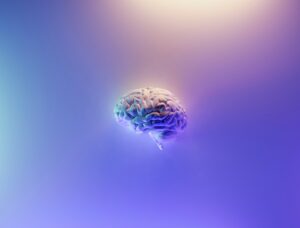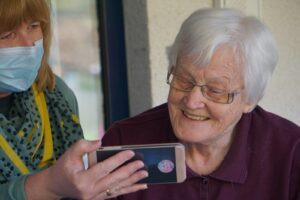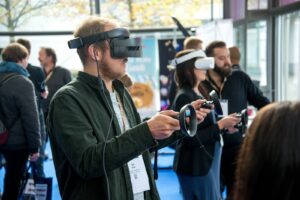We have come across something amazing in this time we live, when devices abound more than cornflakes.
Technology for seniors—not just any tech but tools and apps designed for those struggling with memory problems.
Cognitive health, you see, is the secret sauce to aging like a great wine rather than a cheap beer.
Of our older friends, almost half report a memory slip or two; this sticky situation calls for answers.
Is technology going to save us? You gamble your last cup of coffee to! A growing array of digital tools is here to enable seniors not only with memory problems but also with starting a better life.
Imagine a society in which lost memories never cloud golden years.
On a smartphone, a friendly ping alerts a senior to take their medication or shows them the lunch date timing with Mabel.
Like an old friend at a reunion, a voice assistant sings a tune that dances through the air and brings back wonderful memories.
This is this interesting fusion of “Hey, I remember that!” and “Oh, this is helpful!That invites seniors to laugh, connect, and interact with the world, so helping tech fight cognitive decline.
Let us now chew on these luscious bits:
- Smart Devices & Voice Assistants: More than thirty percent of seniors using devices like Amazon Alexa report memory kicking back in action. It’s like a little brain workout you were not aware you signed up for.
- Medication Management Apps: When digital reminders are in use, a stunning seventy percent of seniors have better luck following their prescriptions. Organization helps us all to reduce anxiety and increase the mental clarity we so yearn for.
- Wearable Technologies: Tracking heart rates and steps is not only for the fitness enthusiast as expected surge in wearable devices like a 50% upswing among seniors. It can also increase brain function, so benefiting two-fold.
Brain training programs are hotter than freshly made cookies in this land of cognitive engagement.
You have Elevate and Lumosity with customized challenges meant to sizzle your memory skills by 25%. Peak and CogniFit games make distributing brainpower as entertaining as a Saturday night bingo game.
Let us dissect it for a clear picture:
- Engagement Devices:
- Digital Notes: Pings straight from your pocket for appointments and pills.
- Fun activities in brain training apps help to increase the memory muscle strength.
- Video calls and social media allow one to stay in touch, much as little digital hugs would do.
- Seniors into this tech pool report flying high on self-esteem, emotional happiness, and that wonderful sense of independence in daily living. These are the hidden elements of a content life.
Still, hang on to your hats. Even with these amazing developments, problems are just waiting around.
For many seniors, tech literacy is like a wall; only 42% feel they could tell a smartphone from a loaf of bread.
Roll out initiatives teaching them the ropes, and then enable them to confidently ride the tech wave.
As we lay out the welcome mat for technology in cognitive health, personalizing—using artificial intelligence to customize experiences depending on how each brain ticks—will take front stage.
Rising to the particular needs of every silver-haired resident, smart homes will guarantee safety and a little bit of independence.
Technology is both a reliable friend and a useful tool on this great search for cognitive vitality.
When we map out the future, we will discover a society in which elderly people boldly walk their road, memories sharp and joyful abound.
With technology at our side, redefining what growing older means becomes possible—keeping the spirit alive even as life pulls a few quick ones on us.
Recognizing Seniors’ Cognitive Health
A fundamental component of aging, cognitive health includes the faculties of memory, decision-making, reasoning, and general brain function.
Maintaining cognitive ability becomes essential for seniors negotiating their twilight years in order to retain freedom and enhance quality of life.
According to studies, one-third of older adults experience cognitive decline, which raises immediate issues for families, caregivers, and medical professionals both.
Although aging is a natural process, it sometimes brings different memory problems.
These difficulties can range from minor forgetfulness to major cognitive impairment, so influencing daily activities and emotional well-being.
In this regard, memory’s value becomes rather obvious.
Memory shapes our interactions, personal history, and capacity to connect with loved ones, so acting as the scaffold on which we build our life.
With several tools now accessible to assist seniors, mitigating the effects of memory loss through creative technologies has become a main focus.
The Value of Seniors’ Memory
Memory is the core of personal history and identity, not only a gathering of past events.
Memories of a senior affect their emotional state, social contacts, and decision-making process.
Good memory helps seniors to keep relationships with friends and family, remember significant events, and stay active members of their communities.
The Alzheimer’s Association estimates that over 6 million Americans 65 years of age and above have Alzheimer’s disease; by 2025 this number is expected to increase to almost 13 million.
Furthermore affected by memory is general mental health and self-esteem.
Seniors with cognitive decline may feel depressed, isolated, and battle with helplessness.
Thus, enhancing quality of life can depend much on memory improvement.
Given the ubiquity of technology in this day and age, it is fitting that different tools and apps be created to meet these needs.
- Based on a study by AARP, almost nine out of ten seniors feel that living a happy life depends on keeping cognitive health.
Common Memory Problems Affecting Older Adults
As they age, seniors often experience particular kinds of memory problems.
These can be long-term memory loss—which makes it difficult to remember past events or information—and short-term memory loss—which influences the capacity to retain fresh information.
Diseases like Alzheimer’s and dementia carry great risk that causes confusion, disorientation, and fractured memories.
- Categories of Memory Problems:
- Short-Term Memory Loss: Problems remembering lately occurring events or data, including appointments or conversations.
- Long-Term Memory Loss: Often affecting personal history and identification of familiar faces, difficulty in accessing stored knowledge
- Forgetfulness: Frustrating and anxiety-inducing is misplacing objects or forgetting regular chores.
- Common Memory Problems: Data
- A poll by the American Psychological Association shows that almost half of older persons claim to have some kind of memory loss.
- Up to 15–20% of seniors 60 years of age and above have age-related cognitive decline.
Knowing these typical memory problems emphasizes the need of technology in helping elderly people overcoming difficulties.
Early identification of cognitive decline allows seniors to access tools providing help, cognitive stimulation, even rehabilitation.
How might technology close the distance?
Technology offers a special chance to improve senior cognitive health.
Emerging as mobile apps, wearable sensors, and smart home technologies are vital in helping to close the support system gap for those with memory loss.
These developments not only act as reminders and tools but also help with social connectivity and mental stimulation—qualities absolutely vital in the fight against loneliness and depression.
- Technology Solutions:
- Digital Reminders: Crucially in helping memory are apps alerting for daily chores, appointments, and medications.
- Engagement Tools: Video chats and social media channels help to preserve family ties, which is absolutely essential for emotional health.
- These brain training apps center on cognitive activities meant to increase memory, problem-solving ability, and general mental agility.
- Statistical Wisdom:
- Seniors who use technology showed a 25% increase in memory recall tasks when compared to those who did not, according a National Institute on Aging study.
Further exploration of particular tools and apps accessible today reveals how dramatically technology shapes senior cognitive health.
It gives their daily life hope and possibilities so they may remain involved and autonomous.
Assistive Tools to Improve Recall
Many assistive tools have surfaced to help seniors improve cognitive engagement and memory.
Though they have different forms and purposes, these instruments have one in common: they help older persons overcome memory-related difficulties so preserving their independence.
Voice assistants and smart speakers
Smart homes are seeing waves from smart speakers and voice assistants including Google Assistant and Amazon Alexa.
These devices help elderly people to create a more linked living environment, so improving their cognitive capacity.
- Important qualities:
- Seniors just give commands, thus the technology is accessible without requiring sophisticated interfaces.
- Users can create automatic reminders for daily chores, appointments, and medications, so preserving regularity.
- These devices can entertain by playing podcasts, reading audiobooks, and offering news updates, so promoting mental activity.
- Impact data:
- Over thirty percent of seniors who use voice assistants say their memory recall connected with reminders and information retrieval has improved.
Many elderly people who might not be as at ease with conventional technology find the simplicity of using voice commands to enable a more intuitive interaction.
Using these tools helps seniors empower themselves to more easily manage daily tasks, so enhancing their memory retention capacity.
Digital Notes and Medication Organization
For seniors with memory problems especially, digital reminders are invaluable tools for organizing appointments and medications.
Devices, apps, and programs help guarantee that prescriptions are taken on schedule and that important visits are not missed.
- Apps and Tools:
- Medisafe and MyTherapy are among the pill reminder apps that track medication adherence and send alerts.
- MedaCube smart pill dispensers send alarms when doses are missed and distribute medication at designated times.
- Figures and conclusions: statistics
- A 2021 study found that using digital reminder apps helped seventy percent of seniors show better adherence to medication schedules.
- Integration of technology with medication management lowers hospital readmissions by 30%, according to studies published in the Journal of the American Geriatrics Society.
Using these digital tools will help seniors greatly reduce the risks related to missing doses and disorganized medication schedules, so improving cognitive function and general well-being.
Wearable Technologies for Monitoring Health
Wearable technology is becoming more and more popular for cognitive health as well as for monitoring conditions.
Smartwatches and fitness trackers among other devices have features meant to help monitor good habits beneficial for memory.
- Principal purposes:
- Constant heart rate monitoring can give comments on physical health, which relates to cognitive ability.
- Encouragement of seniors to remain active supports both physical and mental well-being, which is absolutely vital for cognitive function.
- Perceptive data:
- According to a Statista research, wearables device use among seniors is expected to rise by 50% over the next five years.
- Over a six-month period, seniors using wearable health monitors enhanced cognitive ability by 20% as well as physical activity, according a Mayo Clinic study.
By including health data into daily activities from these wearables, seniors can empower themselves in ways that go beyond conventional memory support, so improving their capacity for active and involved life.
Notable Apps Made to Improve Cognitive Function
Technology has brought in an amazing range of uses meant to enhance senior cognitive health.
These programs aim not only on improving memory but also on providing entertaining tools to inspire cognitive activity and interest.
Brain Training Apps: Boost Lumosity
Apps for brain training have become rather popular as effective and entertaining means of cognitive improvement.
Particularly Elevate and Lumosity provide leading names in the industry with a large selection of games challenging memory, attention, and problem-solving abilities.
- App features:
- Customized training programs based on user performance and preferences abound in both apps.
- Users of engagement metrics can monitor their development over time, so inspiring ongoing improvement.
- Research:
- Seniors who used brain training apps showed a 25% increase in memory recall ability when compared to those who did not use these apps, according a study written up in the Journal of Neuroscience.
These brain training programs inspire elderly people to consistently practice their cognitive abilities, so improving memory of information and mental agility over time.
Games for Memory: Peak, CogniFit
Peak and CogniFit concentrate on memory games meant to engage users while enhancing their memory capacity; fun is therefore included into cognitive enhancement.
- Models of Games:
- These apps offer a range of puzzles with an eye toward memory recall, reaction times, and logical thinking.
- Gamers can see their performance record and get individualized comments meant for development.
- Research insights:
- Studies show that, within eight weeks University of Cambridge, participants using memory games for 15 minutes daily experienced average memory retrieval speeds increase by 15%.
Apart from enhancing cognitive involvement, memory games provide a means of entertainment.
Seniors wishing to improve their memory in a fun and supportive manner will find great advantage in this mix of entertainment and brain training.
Organizer Apps and Reminders: Any.do Todoist
As one ages, effective organization becomes ever more important.
For seniors in managing their daily life, reminder and organizing apps like Todoist and Any.do are indispensable tools that guarantee that chores are done and appointments respected.
- Functionalism:
- Users of task management tools can classify chores, create reminders, and rank activities to help keep their regularity intact.
- These applications encourage accessibility anywhere by working across several devices, so transcending platform synchronization.
- Important Numbers:
- Because of improved structure and organization, seniors using organizer apps reported 40% more effectiveness in handling daily routines.
Seniors can recover control over their daily activities, reduce stress related to neglected obligations, and improve their memory skills by consistent use of these reminder and organizing tools.
Telehealth’s Function in Cognitive Health
For seniors, telehealth has become a lifeline since it improves access to healthcare facilities and solves urgent cognitive health issues.
Seniors can conveniently and successfully maintain their cognitive health by means of remote consultations and online resources.
Remote Consultations for Memory Evaluation
Senior access to memory assessments and healthcare services has been transformed by remote consultations.
Telehealth helps seniors to minimize follow-up and continuous treatment by allowing them to interact with medical professionals from the comfort of their homes.
- Evaluating instruments:
- To assess memory, virtual assessments can call for cognitive tests, screening instruments, and methodically conducted interviews.
- Secure video calls enable follow-ups that help track development and modify treatment plans as necessary.
- Effectiveness Data:
- With a 92% accuracy rate, remote assessments were shown in a study by the American Journal of Geriatric Psychiatry to be as effective as in-person assessments in identifying cognitive disorders.
Senior citizens can get timely interventions, better continuous monitoring, and support all along their cognitive health path by using telehealth.
Resources for Mental Health Online Support Groups
Telehealth also includes online resources that build networks for seniors experiencing cognitive decline.
These sites help seniors to connect with peers and experts so they may exchange experiences, guidance, and emotional support.
- Advantages of internet support:
- Interacting with those who have gone through similar events helps one to feel understanding and belonging.
- Online sites give access to self-care advice, coping mechanisms, and instructional tools.
- Studies show that members of online support groups report a 40% increase in general well-being, so emphasizing the significant influence of community support on mental health.
For seniors who might feel isolated because of memory problems, such internet resources offer a vital lifeline.
Through technology, one can create relationships that help to reduce the obstacles caused by cognitive decline.
Tools That Support Interaction with Caregivers
For seniors dealing with memory issues, creative technologies meant to support caregiver involvement have become absolutely vital.
These technologies build a cooperative support system focused on cognitive health and keep caregivers informed.
- Technology Solutions:
- Platforms like CareZone let caregivers monitor appointments, prescriptions, and communications, so guaranteeing a connected and orderly caring experience.
- Smart technology can notify caregivers to changes in behavior, so offering information that enables quick interventions.
- Effects on Taking Care:
- According to a Family Caregiver Alliance study, technology-enhanced care reduces caregiver stress levels by 50% so improving their capacity to help seniors.
These creative ideas highlight the need of teamwork and communication since they equip caregivers with necessary tools to help seniors more compassionately and successfully.
Improved Memory Using Virtual Reality
Offering immersive experiences that can boost memory and engagement, virtual reality VR has made great progress toward enhancing cognitive health for seniors.
This creative technology could completely change the way older persons handle memory-related issues.
VR Therapeutic Use for Seniors
One area of developing interest in cognitive health is the therapeutic use of VR technology.
While promoting cognitive engagement and emotional well-being, VR experiences offer an immersive environment capable of stimulating mental faculties.
- Medical Uses: Therapeutic
- Senior citizens can re-connect with lost memories or skills by means of virtual reality sessions simulating real-life settings and events.
- Therapists can customize experiences to meet particular needs, such cognitive rehabilitation or the reduction of anxiety.
- Evidence from Statistics:
- After just four sessions, seniors undergoing VR therapy reported a 30% increase in recall ability, according a pilot study by the University of Arizona.
VR is a great tool in memory care since it has the special capacity to carry users to familiar surroundings, so triggering good emotional reactions and enhancing cognitive results.
Virtual Reality Experiences Increase Involvement
The adaptability of VR makes it possible to provide seniors with varied experiences engaging them emotionally as well as cognitively.
These events range from interactive storytelling to virtual tours of important sites, so meeting different interests and needs.
- Participation Events:
- Seniors can virtually travel to new locations or return favorite sites to inspire memories connected with those places.
- Gentle VR games aiming at memory recall can be both entertaining and helpful since they let users engage their cognitive abilities in a fun way.
- Insights from data:
- Research from San Diego State University has shown VR cognitive training games to increase executive function in seniors by as much as 20% within four weeks.
Such encounters not only improve general emotional well-being but also help to sharpen memory skills, so highlighting the dynamic possibilities VR offers in cognitive health.
Studies Validating VR Benefits for Cognitive Function
Constant research supports the positive impact of virtual reality on senior cognitive health.
These studies show how VR technology both immediately and long-term helps to preserve cognitive vitality.
- Important Research Results:
- Senior VR users reported better memory recall, social interaction, and lower degrees of depression according to a thorough study at the National Institute of Health.
- Another study by the University of Southern California indicated that virtual reality immersive settings might set off nostalgic memories connected with improved cognitive capacity.
- Such data increases the need of including VR technology into cognitive health plans and offers a convincing story for its application among elderly people.
Technological Future Directions for Cognitive Health
New uses for cognitive health among seniors are developing as technology advances at an unheard-of speed.
Future trends point to fascinating developments meant to improve older adults’s memory and general cognitive capacity.
Personalized Care: Artificial Intelligence’s Contribution
Personalized approaches to cognitive health are made possible by artificial intelligence (AI), which also enables customized interventions that fit particular needs.
Analyzing preferences and trends helps artificial intelligence guide and inform interactions meant to maximize memory care.
- Important Advances:
- Customized cognitive training courses change depending on performance and personal learning style to maximize user experience.
- Early on identification of possible memory decline risks made possible by predictive analytics will guide appropriate interventions for caregivers.
- Statistical Understanding:
- According to World Health Organisation research, 75% of cognitive health technologies will incorporate artificial intelligence by 2030 to improve user experiences and involvement.
AI offers a major step forward in providing tailored solutions that guarantee seniors get the right help for their particular cognitive health paths.
The possibilities of smart home technology
Smart home technologies present a great chance to improve daily life against the background of cognitive health.
Seniors who design a responsive living space will have more freedom and less chance of memory-related mishaps or inconveniences.
- Innovations in smart homes:
- Further supporting memory and recall, connected devices can automatically change lighting, temperatures, and alerts depending on daily routines and preferences.
- By alerting family members or caregivers to odd activity, smart security systems can offer piece of mind.
- New Data:
- According to an AARP analysis, the acceptance of smart home technologies among seniors is expected to double by 2025, indicating a rising awareness of their possible cognitive support value.
Smart home technologies’ flawless integration into seniors’ life helps to improve memory and promotes independence and security.
Future developments in memory support tools
Memory support tools have a bright future full of innovations ready to transform cognitive care.
- Novelties of Emerging Importance
- Future cognitive enhancement apps will combine sophisticated game design, personalizing tools, and community elements, so enhancing engagement even more.
- Research on brain-computer interface technologies has great potential to offer seniors tailored adapted feedback on cognitive performance.
- Numbers and Forecasts:
Gartner estimates that by 2025 investment in cognitive health technologies will reach $50 billion, underlining the increasing focus on creative solutions for seniors.
Difficulties and Notes of Reference
Although technology offers great possibilities, careful navigation of challenges is essential to guarantee its successful application in enhancing cognitive health among elderly people.
From tech literacy to privacy issues, a careful strategy can help optimize its advantages.
Tech Literacy among Seniors
For many seniors, the literacy gap becomes a significant obstacle as technology gets more included into healthcare.
To fully benefit from the resources at hand, one must first understand and apply digital tools.
- Critical Difficulties:
- Age-related elements like lack of technological knowledge and different degrees of comfort help to explain tech literacy issues and so prevent the use of memory-supportive devices.
- Cognitive problems can complicate learning even more, thus caregivers must help to ensure comfort and understanding with new technology.
- Only 42% of seniors say they feel confident in using technology for health management, according to Pew Research Center; 55% express a want to learn more.
Targeted education and customized support are absolutely necessary in enabling seniors to boldly embrace technology in order to get beyond these obstacles.
Respecting Privacy Using Health Apps
With the flood of health-related technologies, privacy issues have become top focus for elderly people.
Emphasizing the need of using safe applications, protecting private health information is first priority.
- Privacy conflicts:
- Senior citizens’ reluctance to use digital health tools can result from data breaches, information abuse, and opaque data handling policies.
- Building confidence and trust depends critically on education on privacy policies followed by service providers.
- Resolving Issues:
- To allay concerns and guarantee user satisfaction, providers have to give security aspects and open data handling policies top priority.
By means of safe applications, seniors can build confidence so enabling them to enjoy the benefits of technology without sacrificing their privacy.
Managing Technology Use Against Personal Interaction
Although technology offers great support, it’s important to strike a balance between digital contacts and deep personal connection.
Senior engagement with cognitive-enhancing technologies guarantees that their social and emotional needs are satisfied through human interaction; hence, it is still most important.
- Juggling needs:
- Along with using technology to improve emotional well-being, caregivers and family members should support frequent socializing and physical interaction.
- Frequent check-ins and coordinated activities help to maximize memory-enhancing tools, so guaranteeing a comprehensive approach to cognitive health.
- Statistical Insight:
- The National Council on Aging emphasizes the need of preserving personal relationships since social interaction increases cognitive ability by 30%.
The aim is to create a situation whereby technology supports rather than replaces the essential function of personal interaction in the cognitive development of elderly people.
Final Thought
The potential for tech-driven support has never been more important given millions more Americans suffer with varying degrees of cognitive decline and almost 6 million Americans live with Alzheimer’s disease.
Wearable devices, digital reminders, and smart speakers are not only tools; they are a lifeline, providing freedom and involvement in a world where memory loss might feel isolating and frightening.
Furthermore, research show that interactive tools like virtual reality experiences and brain training apps can significantly increase cognitive ability.
Users of brain training apps, for example, might experience up to 25% improvement in memory recall, so enabling seniors to recover elements of their identity threatened by memory loss.
This implies that these kinds of technologies are not only conveniences; rather, they are absolutely essential for preserving the dignity and confidence of elderly people negotiating the challenges of aging.
As artificial intelligence and smart home technologies proliferate and expected to double in use among seniors by 2025, the statistics points a bright future. Such developments not only offer customized assistance but also improve familiar surroundings, so providing comfort and security.
These developments highlight an exciting horizon where technology and compassionate care interact and show society’s increasing awareness of the need of cognitive health in aging.
In the end, embracing these technical developments while tackling issues like tech literacy and privacy issues will help to create an environment in which seniors might flourish.
Combining individualized technology solutions with human connection will enable us to develop a whole approach honoring the rich tapestry of memories and identities and supporting cognitive health in the twilight years.
The dedication to using technology to improve cognitive health points a clear future for our seniors whereby they can keep interacting, connecting, and growing.
Usually Asked Questions
What is cognitive health, and why should seniors give it top priority?
Cognitive health includes general brain function, memory, decision-making, and reasoning.
Maintaining independence and improving quality of life depend on seniors’ cognitive ability remaining intact.
Among older adults, how common is cognitive decline?
About one-third of older adults suffer with cognitive decline, according to studies, which emphasizes the need of support and care for memory problems as individuals age.
List some typical memory problems seniors experience.
Many times, seniors have general forgetfulness, long-term memory loss, and short-term memory loss.
These problems might seriously affect daily activities and emotional stability.
How might technology support senior cognitive health?
Through apps and devices, technology can assist seniors with reminders for medications and appointments, provide cognitive engagement through games, and preserve social contacts—all of which are absolutely vital for emotional health.
Which kinds of tools would help seniors dealing with memory problems?
Supporting memory and enhancing cognitive health are much aided by devices including smart speakers with voice assistants, digital reminder apps, smart pill dispensers, and wearable technologies.
Exist any particular apps meant to improve senior cognitive skills?
Indeed, memory games like Peak and CogniFit as well as brain training apps like Elevate and Lumosity are meant to involve users and increase memory recall and cognitive abilities.
How might telehealth help seniors with their cognitive health?
Through virtual consultations, telehealth gives seniors remote access to healthcare providers, so enabling memory tests and continuous support.
This method improves cognitive health path and lowers obstacles to treatment.
How might virtual reality VR help those suffering with memory problems?
VR provides immersive experiences meant to boost memory recall and cognitive involvement, so stimulating mental faculties and producing therapeutic uses.
Which future developments in technology for cognitive health show promise?
Future trends include developments in smart home technology, artificial intelligence for tailored treatment, and fresh ideas in memory support devices.
How might technology be used by caregivers to help seniors experiencing cognitive loss?
Care coordination apps let caregivers monitor activities through technology, track appointments and medications, and make sure seniors get timely help without overloading them.









